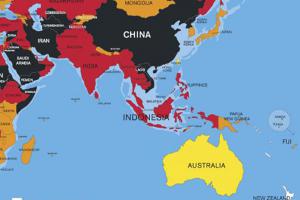
TJ Aumua
AUCKLAND (Pacific Media Watch): Celebrated annually on May 3, this year's World Press Freedom Day celebrated the theme of "Access to Information and Fundamental Freedoms: This Is Your Right!" Here is a rundown on some of the Pacific celebrations marking the day:
Fiji
Fiji, ranked as one of the most restricted Pacific Islands for media freedom in the Reporters Without Borders World Press Freedom Index, saw reportage that acknowledged the progression of Fiji media freedom since the 2014 elections.
A Fiji Times article reported the paper's editor-in-chief Fred Wesley saying that although the country was making progress, “we still have a long way to go”.
Wesley addressed the Freedom of Information Bill, which was queried by the opposition in Parliament last week and is expected to be tabled in the next parliamentary session.
He said: "I would like to believe that this Bill will allow the media access to information of public interest and, in the long term, help push informed discussion of national issues in the public domain."
However, Fiji Sun editor Nemani Delaibatiki, is quoted in the newspaper's editorial today, saying media freedom in Fiji was “real” and not a “perception as some people claim”.
“They still live in an era when there was censorship and media control.
“That period has long gone and the media are now free to practise. Most of what is in the media law now was there before."
He reminded Fiji journalists “all freedom, however, comes with responsibility".
Palau
According to the Pacific Islands News Association (PINA), Palau’s media freedom day was an historic moment where the media industry witnessed President Tommy E. Remengesau Jr. sign Presidential Proclamation 16-177, affirming World Press Freedom Day for the Republic of Palau.
Papua New Guinea
The Media Council of Papua New Guinea made an appeal to the government to respect the watchdog role of the media and to allow journalists to report without “fear or favour”.
In its remarks, the council referred to incidents where the country media were intimidated or harassed by governing authorities.
Samoa
Samoan Prime Minister Tuilaepa Sa’ilele Malielegaoi addressed World Press Freedom Day earlier in the week at the National University of Samoa.
Speaking in front of media and journalism students he commented on the governments openness and accessibility to the media in Samoa.
“Every week on Wednesdays and Thursdays, I open my doors for media interviews. I don’t know if any other Prime Minister sets aside two afternoons a week to be interviewed by reporters where they are given carte blanche with their questions. But these sessions are opportunities for the media to engage me as leader of the nation, on a broad spectrum of issues and current events.
“My only grievance is in the unflattering photographs they seem to take of me; not one photograph of theirs has truly captured this winning smile.
“Making time for the media and responding to queries is one of the simplest ways our leaders in Government can ensure transparency and accountability in public service, which is a message I often emphasise at the monthly Cabinet Development Committee meetings attended by Government’s leadership.”
On the contrary, Pacific Beat interviewed the editor of the Samoa Observer, Keni Lesa, who said although Samoa was leading the way for press freedom in the Pacific, placed at 29th in the press freedom index, he was still concerned with the transparency and media access to government information.
“This is an issue I have, this is my personal opinion,” Lesa told Pacific Beat.
“There are a lot of challenges that exist on the ground here. You know of course, we have a very interesting democracy, we’ve got a one party state, and although in terms of our relationship with the government there is no doubt we have access to them but whether they answer a question that’s another story altogether.”
“And basic access to key documents and public statements that are not available to us here at The Observer, most of the stuff we published is actually leaked to us. So those are some of the key challenges and that kind of worries me as an editor about what is being said out there as Samoa being the best performing Pacific country in terms of media freedom.”
Tonga
Matangi Tonga Online published an article titled “Tonga celebrates Press Freedom Day quietly”. But although the country may have marked the occasion quietly, the message in the article was resolute and direct, addressing the recent controversy between Tongan Prime Minister ‘Akilisi Pohiva and the Tongan Broadcasting Commission (TBC).
The article stated the request by the Tongan Prime Minister to suspend a TBC journalist was damaging Tonga’s media freedom rating.
“The clash between the Prime Minister and the Tonga Broadcasting Commission (TBC), dubbed as a “public broadcaster”, is hindering a struggle by the Tongan media in general to firmly establish media freedom in Tonga.
“Early last year government made a move to reduce the number of boards, which oversee the operation of its 15 public enterprises, including the TBC.”
“The decision meant that board members had to resign, but the chairwoman and one of the directors of the TBC challenged the decision.
“Then a Supreme Court decision in April declared that the two, Lady Fusitu'a and Lady Fielakepa, are still members of the board. The public is left with a perception that the TBC remains in a confused situation.”
Vanuatu
Vanuatu celebrated with a parade where guest speakers spoke on media freedom, and workshops on news reporting took place.
This work is licensed under a Creative Commons Attribution-NonCommercial 3




